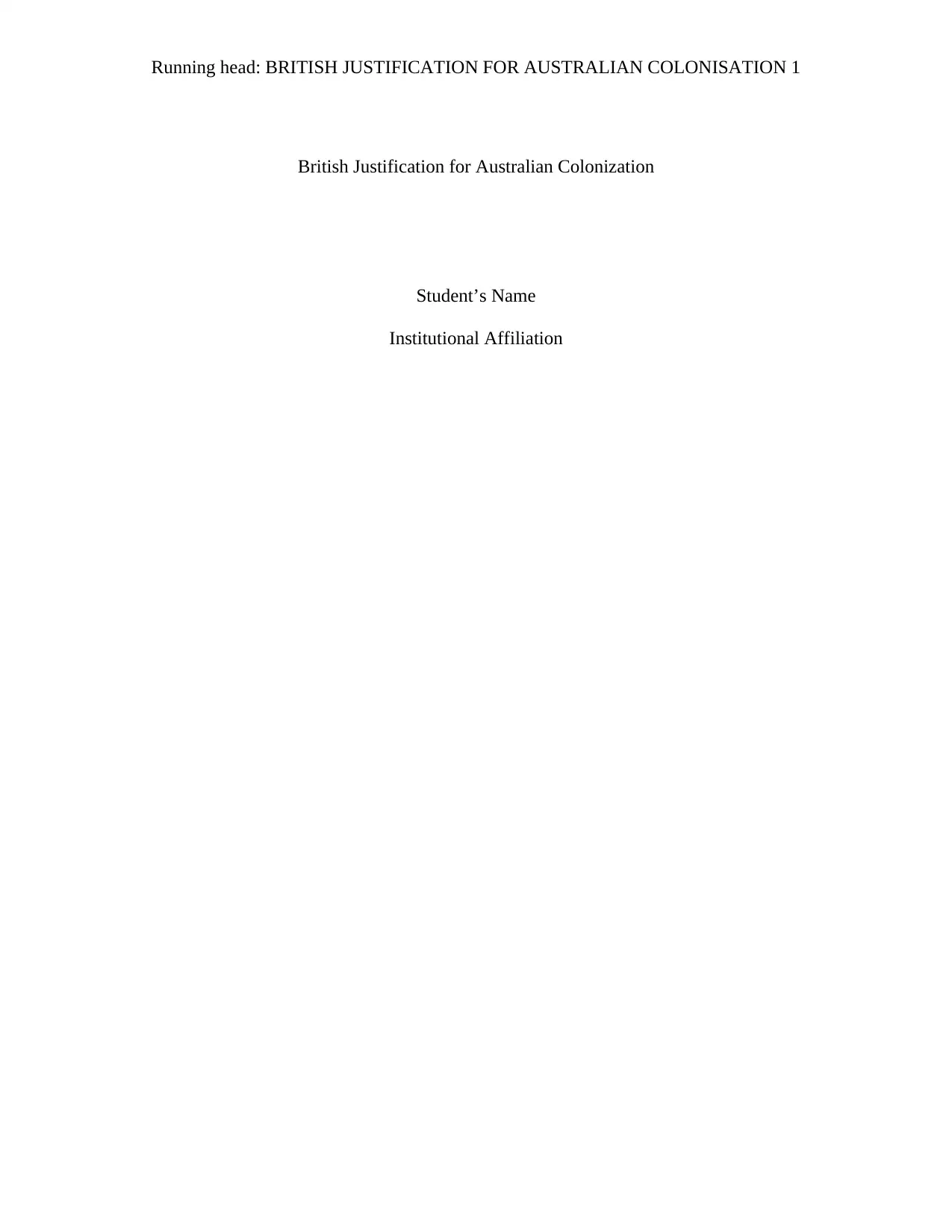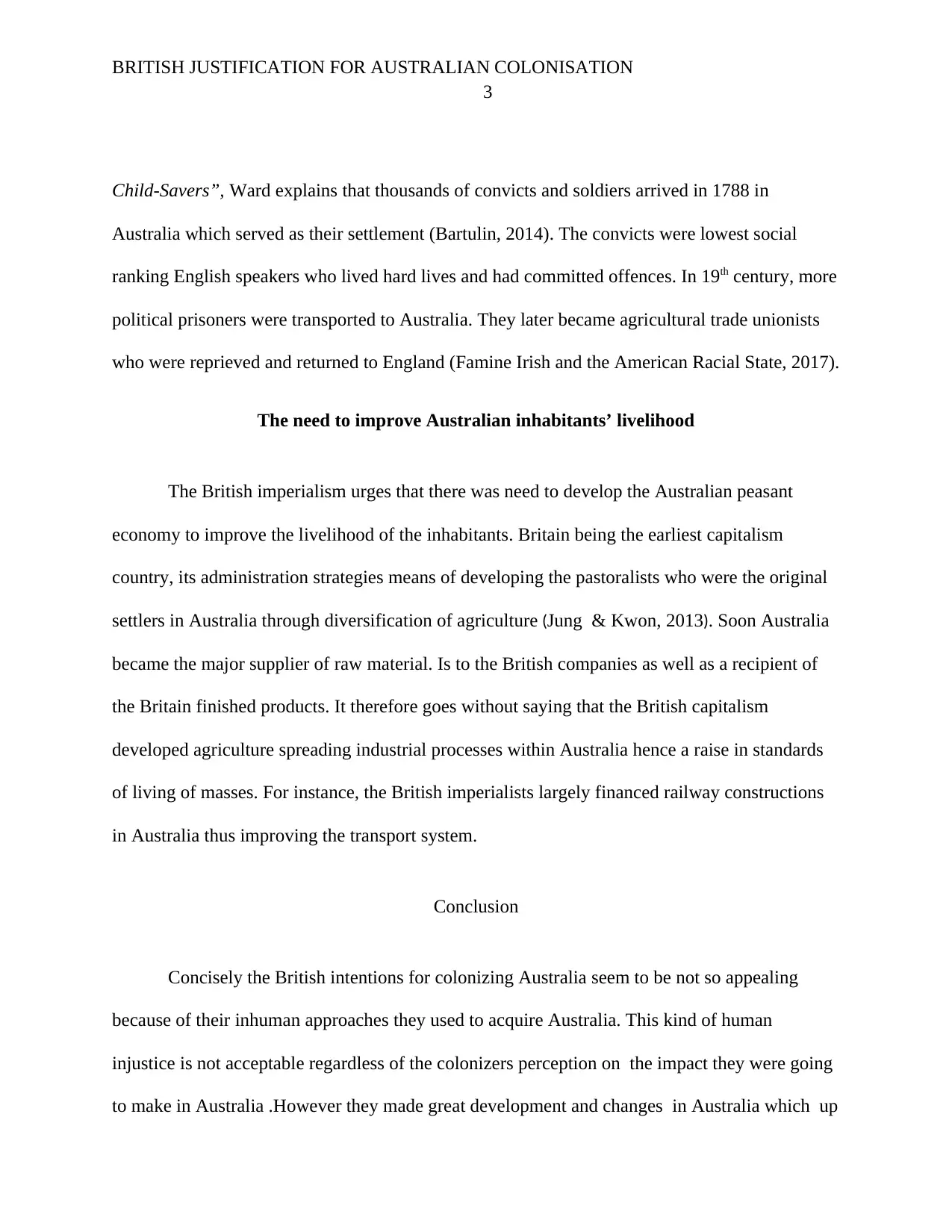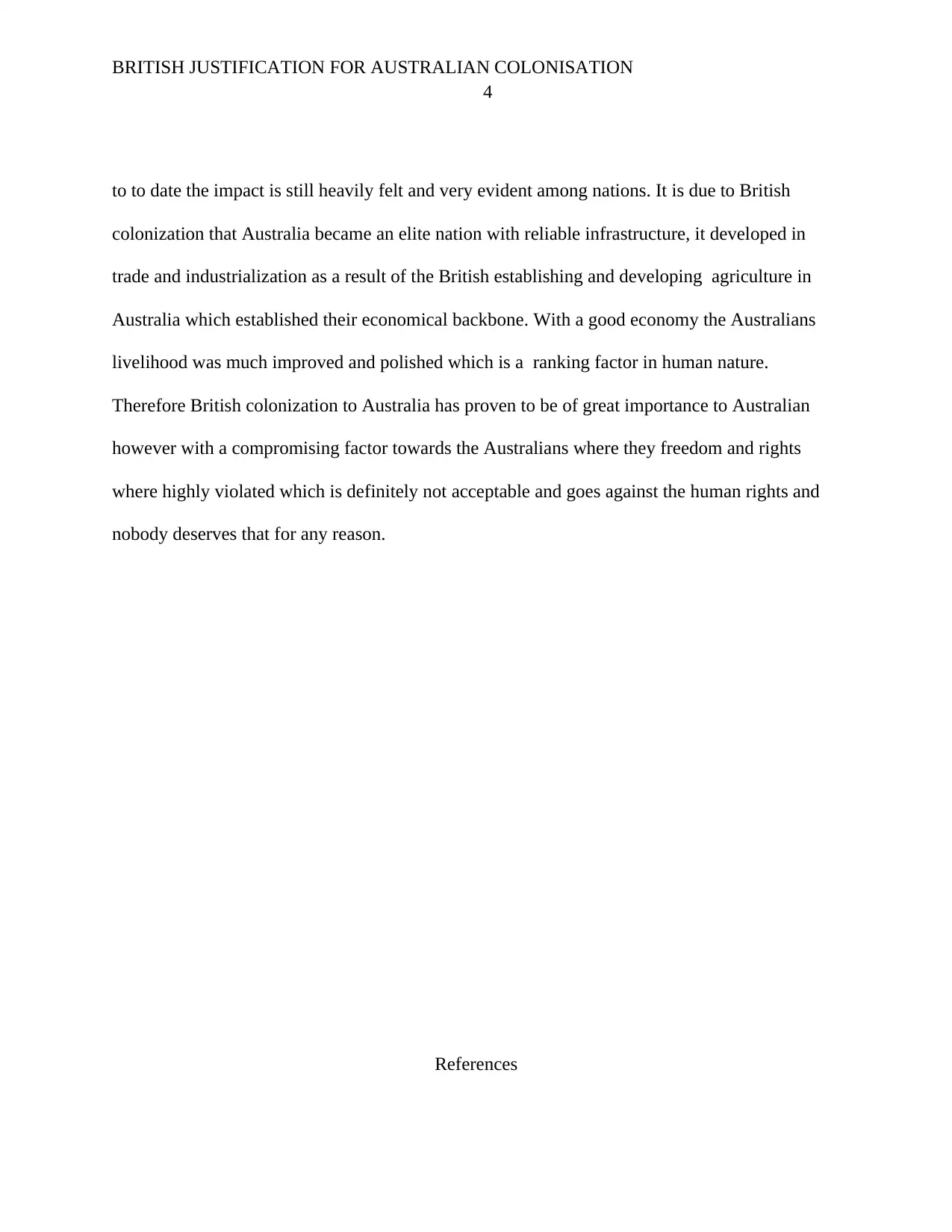Analyzing the British Justification for Australian Colonization Essay
VerifiedAdded on 2020/05/08
|5
|831
|374
Essay
AI Summary
This essay critically examines the British justification for the colonization of Australia, focusing on the establishment of a penal colony and the purported improvement of the Australian inhabitants' livelihood. It argues that while Britain cited these reasons, their methods, including forceful land grabbing, starvation, and assimilation, contradicted their stated intentions. The essay highlights the historical context, including Australia's initial lack of appeal to European powers, its use as a remote penal colony, and the subsequent development of agriculture and industry. It concludes that although British colonization led to significant infrastructure and economic development, the inhumane treatment of the indigenous population raises ethical concerns and questions the validity of the justifications provided. The essay emphasizes the lasting impact of British colonization on Australia's economy and social structure.

Running head: BRITISH JUSTIFICATION FOR AUSTRALIAN COLONISATION 1
British Justification for Australian Colonization
Student’s Name
Institutional Affiliation
British Justification for Australian Colonization
Student’s Name
Institutional Affiliation
Paraphrase This Document
Need a fresh take? Get an instant paraphrase of this document with our AI Paraphraser

BRITISH JUSTIFICATION FOR AUSTRALIAN COLONISATION
2
Introduction
It goes without argument that Australian colonization by the British was on two major
factors. These are; the need for a new convent settlement and the need to improve Australian
inhabitants’ livelihood. Historically, Britain seized Australia and settled it as a penal colony in
1788. The British administration used a number of methods to conquer the Australian
inhabitants. These range from: starving, assimilation, forceful land grabbing, poisoning, and
shooting, among other (Bartulin, 2014).The above stated methods are human injustices in nature.
This means the British had no good intension as it urges thereby this paper seeks to establish this
truth. There is an importance of choosing this topic so as to establish the genuineness of British
argument on their intentions for colonizing Australia. The approaches used by the British
contradict their intentions. Justifications are discussed below.
Need for a new convict settlement
Historically, Australia continent was not a center of attraction to many European powers
until the 20th century. Australia ( McCormick, (2016) was used as a British penal colony since it
was in remote area with fewer infrastructures hence never attracted most of states during the
colonization period. At the inception stage of the colonial establishment, there was need to build
an outpost homestead for convicts. Australia appeared the most convenient since the native
population was docile and had no intention of resisting the Europeans. Australia lacked
infrastructure therefore served as a perfect place to inhabit British criminals in addition to
Georgia and Carolina. For example, in the journal “Institutionalizing Racial Justice The Black
2
Introduction
It goes without argument that Australian colonization by the British was on two major
factors. These are; the need for a new convent settlement and the need to improve Australian
inhabitants’ livelihood. Historically, Britain seized Australia and settled it as a penal colony in
1788. The British administration used a number of methods to conquer the Australian
inhabitants. These range from: starving, assimilation, forceful land grabbing, poisoning, and
shooting, among other (Bartulin, 2014).The above stated methods are human injustices in nature.
This means the British had no good intension as it urges thereby this paper seeks to establish this
truth. There is an importance of choosing this topic so as to establish the genuineness of British
argument on their intentions for colonizing Australia. The approaches used by the British
contradict their intentions. Justifications are discussed below.
Need for a new convict settlement
Historically, Australia continent was not a center of attraction to many European powers
until the 20th century. Australia ( McCormick, (2016) was used as a British penal colony since it
was in remote area with fewer infrastructures hence never attracted most of states during the
colonization period. At the inception stage of the colonial establishment, there was need to build
an outpost homestead for convicts. Australia appeared the most convenient since the native
population was docile and had no intention of resisting the Europeans. Australia lacked
infrastructure therefore served as a perfect place to inhabit British criminals in addition to
Georgia and Carolina. For example, in the journal “Institutionalizing Racial Justice The Black

BRITISH JUSTIFICATION FOR AUSTRALIAN COLONISATION
3
Child-Savers”, Ward explains that thousands of convicts and soldiers arrived in 1788 in
Australia which served as their settlement (Bartulin, 2014). The convicts were lowest social
ranking English speakers who lived hard lives and had committed offences. In 19th century, more
political prisoners were transported to Australia. They later became agricultural trade unionists
who were reprieved and returned to England (Famine Irish and the American Racial State, 2017).
The need to improve Australian inhabitants’ livelihood
The British imperialism urges that there was need to develop the Australian peasant
economy to improve the livelihood of the inhabitants. Britain being the earliest capitalism
country, its administration strategies means of developing the pastoralists who were the original
settlers in Australia through diversification of agriculture (Jung & Kwon, 2013). Soon Australia
became the major supplier of raw material. Is to the British companies as well as a recipient of
the Britain finished products. It therefore goes without saying that the British capitalism
developed agriculture spreading industrial processes within Australia hence a raise in standards
of living of masses. For instance, the British imperialists largely financed railway constructions
in Australia thus improving the transport system.
Conclusion
Concisely the British intentions for colonizing Australia seem to be not so appealing
because of their inhuman approaches they used to acquire Australia. This kind of human
injustice is not acceptable regardless of the colonizers perception on the impact they were going
to make in Australia .However they made great development and changes in Australia which up
3
Child-Savers”, Ward explains that thousands of convicts and soldiers arrived in 1788 in
Australia which served as their settlement (Bartulin, 2014). The convicts were lowest social
ranking English speakers who lived hard lives and had committed offences. In 19th century, more
political prisoners were transported to Australia. They later became agricultural trade unionists
who were reprieved and returned to England (Famine Irish and the American Racial State, 2017).
The need to improve Australian inhabitants’ livelihood
The British imperialism urges that there was need to develop the Australian peasant
economy to improve the livelihood of the inhabitants. Britain being the earliest capitalism
country, its administration strategies means of developing the pastoralists who were the original
settlers in Australia through diversification of agriculture (Jung & Kwon, 2013). Soon Australia
became the major supplier of raw material. Is to the British companies as well as a recipient of
the Britain finished products. It therefore goes without saying that the British capitalism
developed agriculture spreading industrial processes within Australia hence a raise in standards
of living of masses. For instance, the British imperialists largely financed railway constructions
in Australia thus improving the transport system.
Conclusion
Concisely the British intentions for colonizing Australia seem to be not so appealing
because of their inhuman approaches they used to acquire Australia. This kind of human
injustice is not acceptable regardless of the colonizers perception on the impact they were going
to make in Australia .However they made great development and changes in Australia which up
⊘ This is a preview!⊘
Do you want full access?
Subscribe today to unlock all pages.

Trusted by 1+ million students worldwide

BRITISH JUSTIFICATION FOR AUSTRALIAN COLONISATION
4
to to date the impact is still heavily felt and very evident among nations. It is due to British
colonization that Australia became an elite nation with reliable infrastructure, it developed in
trade and industrialization as a result of the British establishing and developing agriculture in
Australia which established their economical backbone. With a good economy the Australians
livelihood was much improved and polished which is a ranking factor in human nature.
Therefore British colonization to Australia has proven to be of great importance to Australian
however with a compromising factor towards the Australians where they freedom and rights
where highly violated which is definitely not acceptable and goes against the human rights and
nobody deserves that for any reason.
References
4
to to date the impact is still heavily felt and very evident among nations. It is due to British
colonization that Australia became an elite nation with reliable infrastructure, it developed in
trade and industrialization as a result of the British establishing and developing agriculture in
Australia which established their economical backbone. With a good economy the Australians
livelihood was much improved and polished which is a ranking factor in human nature.
Therefore British colonization to Australia has proven to be of great importance to Australian
however with a compromising factor towards the Australians where they freedom and rights
where highly violated which is definitely not acceptable and goes against the human rights and
nobody deserves that for any reason.
References
Paraphrase This Document
Need a fresh take? Get an instant paraphrase of this document with our AI Paraphraser

BRITISH JUSTIFICATION FOR AUSTRALIAN COLONISATION
5
Bartulin, N. (2014). 5 Interwar Croatian Ethno linguistic-Racial Theories. The Racial Idea in the
Independent State of Croatia , 93-126. doi:10.1163/9789004262829_007
Chapter Six. Navigating the Ethno-Racial State. (2016). Becoming Black Political Subjects.
doi:10.1515/9781400881079-007
Famine Irish and the American Racial State. (2017). doi:10.4324/9781315393469
Jung, M., & Kwon, Y. (2013). Theorizing the US Racial State: Sociology Since Racial
Formation. Sociology Compass, 7(11), 927-940. doi:10.1111/soc4.12078
McCormick, J. (2016). Fourteen Reasons Why Europe Matters to Britain. Why Europe Matters
for Britain, 146-163. doi:10.1057/978-1-137-57685-9_9
5
Bartulin, N. (2014). 5 Interwar Croatian Ethno linguistic-Racial Theories. The Racial Idea in the
Independent State of Croatia , 93-126. doi:10.1163/9789004262829_007
Chapter Six. Navigating the Ethno-Racial State. (2016). Becoming Black Political Subjects.
doi:10.1515/9781400881079-007
Famine Irish and the American Racial State. (2017). doi:10.4324/9781315393469
Jung, M., & Kwon, Y. (2013). Theorizing the US Racial State: Sociology Since Racial
Formation. Sociology Compass, 7(11), 927-940. doi:10.1111/soc4.12078
McCormick, J. (2016). Fourteen Reasons Why Europe Matters to Britain. Why Europe Matters
for Britain, 146-163. doi:10.1057/978-1-137-57685-9_9
1 out of 5
Related Documents
Your All-in-One AI-Powered Toolkit for Academic Success.
+13062052269
info@desklib.com
Available 24*7 on WhatsApp / Email
![[object Object]](/_next/static/media/star-bottom.7253800d.svg)
Unlock your academic potential
Copyright © 2020–2026 A2Z Services. All Rights Reserved. Developed and managed by ZUCOL.





